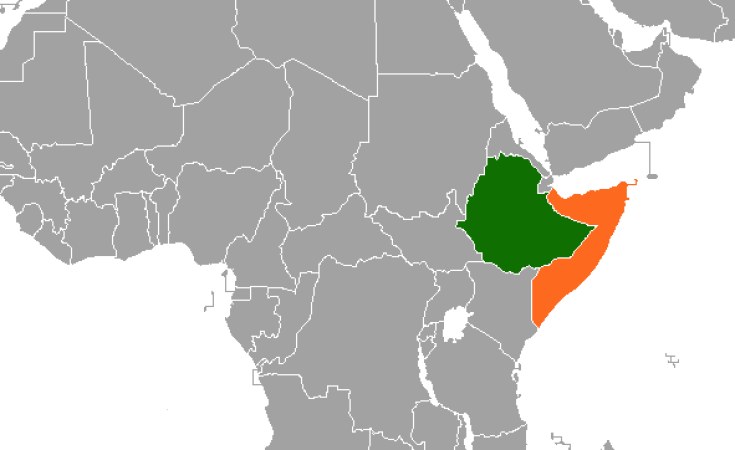Mogadishu, Somalia — Tensions between Somalia and Ethiopia escalated over the weekend following allegations by Somalia's president that Ethiopian security forces tried to bar him from attending the African Union summit in Addis Ababa.
The incident came amid a dispute between the countries involving the breakaway region of Somaliland.
Speaking to journalists before cutting short his trip, Somali President Hassan Sheikh Mohamud said the actions of the Ethiopian forces were part of a grand scheme by Ethiopian Prime Minister Abiy Ahmed to annex part of Somalia.
"This morning when I prepared myself to attend the closing session of the summit, the Ethiopian security blocked my way," Mohamud said Saturday, adding that he wasn't allowed "to come out of the hotel and go on with my cars and entourage."
Ethiopia, he said, wanted "to annex part of Somalia to Ethiopia and to disrespect the African Union summit participants like me."
The Somali president eventually gained access to the meeting, entering with the security team of Djibouti President Ismael Omar Guelleh.
The Ethiopian government rejected Mohamud's claim and said the Somali leader and his delegation declined to be accompanied by a security detail assigned to him.
Hard to place blame
Matt Bryden, co-founder of Sahan Research, a policy and security think tank, said he thought it wasn't easy to apportion blame, because there could have been a breakdown in security protocol.
"Either the Ethiopians unreasonably denied access to the president and his security detail, or the Somali security personnel escorting the president were trying to bring weapons into a location into which they were not permitted," Bryden said.
The claims by Mohamud escalated tensions that were already running high because of an agreement signed New Year's Day between Abiy and Somaliland President Muse Bihi.
The memorandum of understanding would grant landlocked Ethiopia access to the Gulf of Aden to build a naval base. In exchange, according to Somaliland, Ethiopia would recognize it as an independent state. Ethiopia, however, said it would merely consider that possibility.
Somalia, which still considers Somaliland part of its territory, is insisting the agreement be canceled.
The African Union has called for dialogue to resolve the issue, but a former Somali government minister, Abdullahi Godah Barre, said that wasn't the right move now.
Barre said dialogue is always good, but Ethiopia has to retract the deal so that the dialogue will be without conditions. No one, he said, will accept negotiations based on annexation.
Ethiopia has not explicitly rejected Somalia's annexation claim, but Abiy said this month that "Ethiopia does not wish to harm Somalia."
According to Bryden, the issue is complicated by Somalia's dependence on Ethiopian troops for security in southwestern parts of the country.
"Somalia has still not called for Ethiopian troops to leave southwestern Somalia, which would be disastrous, because presumably, places like Beletweyn, Bulobarde, Baidoa and other towns would fall into the hands of al-Shabab if Ethiopia were to do so," he said.
Ethiopia and Somalia have a long history of tensions and have even gone to war with each other. However, in recent years, the two countries have enjoyed relatively friendly relations. Ethiopia currently deploys its troops into Somalia within and outside the African Union framework.


